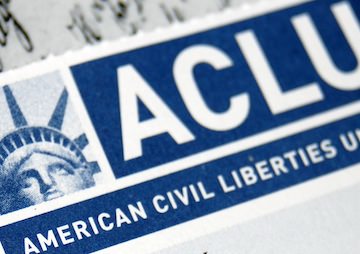Oh, No: The ACLU Helped Jail CIA Whistleblower John Kiriakou
One of the U.S.' most respected civil liberties organizations collaborated with President Reagan's CIA in writing secrecy laws that enabled the prosecution of Bush-era whistleblower John Kiriakou, reports Mark Ames at Pando Daily. Photo by scottfeldstein (CC BY 2.0)
Photo by scottfeldstein (CC BY 2.0)
Photo by scottfeldstein (CC BY 2.0)
The ACLU, one of the United States’ most respected civil liberties organizations, collaborated with President Reagan’s CIA in writing secrecy laws that enabled the prosecution of Bush-era CIA whistle-blower John Kiriakou, according to Mark Ames at Pando Daily.
Sentenced to 30 months in prison in January 2013 on charges relating to his confirmation that the CIA waterboarded Al-Qaida prisoners, Kiriakou was “the first CIA spy ever jailed for leaking secrets, and only the second American ever convicted under a 1982 law making it a crime to publicly identify covert CIA agents,” writes Ames.
The genesis of that law traces back to efforts in the mid-1970s to early 1980s to prevent journalists from revealing the identities of CIA agents working undercover abroad. In what became a successful attempt to stem a growing public movement against the agency, the assassination of agent Richard Welch in Greece in late 1975 was blamed on a U.S. opposition magazine that had published his name. (That Welch’s identity was already publicly available in multiple places was not generally known until later, after a particularly grand state funeral.)
Significant opposition remained after the exploitation of Welch’s death in the form of a “formidable liberal lobby focused on defending civil liberties,” Ames writes. But that changed when “the most powerful of these institutions, the ACLU, broke away and agreed to collaborate with Reagan’s CIA in crafting new secrecy laws.” A bill criminalizing the leaking of CIA agents’ names resulted. Negotiating from the ACLU’s side were Morton Halperin, today a senior fellow at George Soros’ Open Society, and Jerry Berman, who went on to become co-founder of the Silicon Valley-funded Center for Democracy and Technology.
Ames lets the late investigative reporter Angus MacKenzie tell the story. From MacKenzie’s 1999 book “Secrets: The CIA’s War at Home,” Ames cites:
“[O]n July 13 [1981], Morton Halperin, and ACLU attorney Jerry Berman paid an unusual visit to CIA headquarters for private discussions of the Intelligence Identities Protection Act. Halperin and Berman were convinced that liberal opposition to the bill was weak and and that the Reagan administration would be able to steamroller it through Congress. As they saw it, their best hope was to salvage the situation. Offering a compromise, they tried to convince CIA lawyers to insert language that would retain a partial protection for journalists. Under the compromise, in order to obtain a conviction prosecutors would have to prove that journalists had ‘intent to harm’ intelligence operations. Theoretically, this would have barred prosecution of reporters who were just doing their job. In exchange, Halperin and Berman agreed to switch their position: the ACLU would refrain from opposing the Intelligence Identities Protection Act. Further, Berman and Halperin promised the CIA that their supporters in Congress would not try to delay the bill. It was a historic agreement between the ACLU and the CIA, two old political enemies.”
Ames writes that the “ACLU’s collaboration with the CIA on devising a secrecy bill had a devastating effect on liberals’ will to resist the Reagan Right’s momentum, just as the old liberal establishment was entering a terminal stage of rot. The compromise bill protecting journalists while selling government leakers down the river consecrated in law a pretty sleazy deal between the media and the National Security State that we now take for granted and rarely question. Everyone in the liberal establishment started caving.”
Citing MacKenzie again, we read:
“Halperin’s compromise was a signal that the ACLU would not mobilize its quarter million members to lobby Capitol Hill in defense of the First Amendment rights of government employees or reporters. As the ACLU position became clear in the ensuing months, the traditional liberal coalition against secrecy began to disintegrate both inside and outside Congress. Over the next twelve years, the Reagan and Bush administrations were emboldened to invent new means to control information.”
Ames goes on about Halperin and Berman:
One of the ACLU collaborators, Morton Halperin, wound up providing crucial progressive cover for the 2008 FISA Amendments Act, expanding surveillance powers and giving immunity to telecoms caught violating wiretapping laws. The other ACLU collaborator, Jerry Berman, was named executive director of the Electronic Frontier Foundation in the early-mid 90’s. Under Berman, the EFF played a controversial, collaborative role in expanding government surveillance of the Internet.
“It’s an all-too-familiar scenario going back to the compromise rationale behind the ACLU’s collaboration with Reagan’s CIA,” Ames concludes.
Read Ames’ full article here.
— Posted by Alexander Reed Kelly.
Your support is crucial...As we navigate an uncertain 2025, with a new administration questioning press freedoms, the risks are clear: our ability to report freely is under threat.
Your tax-deductible donation enables us to dig deeper, delivering fearless investigative reporting and analysis that exposes the reality beneath the headlines — without compromise.
Now is the time to take action. Stand with our courageous journalists. Donate today to protect a free press, uphold democracy and uncover the stories that need to be told.






You need to be a supporter to comment.
There are currently no responses to this article.
Be the first to respond.